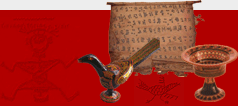| 您的位置:首页 --> 与会学者 --> 论文提要 |
《玄通大书》占卜理论研究
A Study of Divination Theory in the Xuan Tong Da Shu
陈世鹏 Chen Shipeng
贵州民族学院民族文化学院
【摘要】《玄通大书》是毕摩文化中最重要的占卜经典。该书是丁文江先生1930年在大方收集的第一部彝文文献。由《爨文丛刻》的翻译者罗文毕先生译名为《玄通大书》,但对原书未翻译。马学良先生主编《增订爨文丛刻》时。才组织人翻译了《玄通大书》,编入《增订爨文丛刻》中、下册。原书分为“暑舍”和“署莫”两个部分。“署舍”彝语意为金书,有其书珍贵如金之意,全书共有60个标题。内容主要是根据男女出生不同的年、月、日、时以及所逢的天干、地支来推算一个人的命运。是彝族先民对人生未来预测的一种探索。
“署莫”意为大书。有其占卜内容极其广泛之意。彝族先民凡耕种、放牧、狩猎、作战、建房、入学、贸易、走亲访友、婚嫁、祭祀、乔迁等等都要请毕摩选择吉日良辰。全书共有244个标目。本文对《玄通大书》中的占卜理论进行了探讨,其理论主要有阴阳五行说、八卦说、干支说、占星术、十二宫辰说、天人感应论等等。在人生命运和吉凶日的推算上采用了象征律和演绎法等推算方法。并对彝汉相关理论进行了比较和批判。
关键词: 署舍 署莫 占卜理论
Abstract
The Xuan Tong Da Shu is one of the most important works of divination
in Bimo Culture. The book is the first one in old Yi language
among the works collected by Ding Wenjiang in Dafang area in 1930.
The title was translated by Luo Wenbi, who was the translator
of Cuan wen cong ke, while the text was not contained in the translation.
The full translation completed when Ma Xueliang was the chief
editor of the book Zeng Ding Cuan Wen Cong Ke. The Xuan Tong Da
Shu is contained in the second and third part of “Zeng ding Cuan
wen cong ke", divided into two parts named "Shushe"
and "Shumo". "Shushe" means "The Book
of Value" in Yi language. The meaning shows how valuable
the book is. There are 60 titled sections in the book, containing
the main subject that the fate of a person could be reckoned based
on the one's gender, birth time which is expressed in day/month/Year
and "Tiangan" "Dizhi". It exhibits the exploring
of Yi ancestors’ prognostication of their future. “Shumo” means
The Big Book. It also means the content of divination is very
broad. The ancestors of Yi nationality would always go to “Bimo”
for help in choosing a auspicious day whenever they are going
to plough, to graze their animals, to hunt, to battle, to build
a new house, to enter school, to do some business, to visit their
relatives and friends, to marry, to sacrifice, to move to a new
place or get a promotion and so on. There are 244 lists in the
book in total. This article probes into the divinationon theories
of “Xuantongdashu” which concerns mainly about theory of “Yin”
and “Yang” and the five elements, the Eight Trigrams, Ganzhi theory,
Astrology, Shiergongchen theory, theory of the telepathy between
God and human beings and so on.. On the aspect of reckoning the
fate of human and good-or-ill luck day, it adopted the way of
symbolization and deductive method. Besides that, it has conducted
some comparisons and criticizes some related theories.
Keywords: Shushe, Shumo, divination theory
作者简介:
陈世鹏,彝族。长期从事彝族文化的研究,有专著《黔彝古籍举要》(32万字),发表过《原始宗教对彝族传统文学的影响》、《彝族史探究》、《彝族诗人余家驹和他的美学观》、《夜郎文化与彝族》相关论文数十篇。在中国云南石林参加过第三界国际彝学会、2003年应加拿大印地安联合学院邀请参加原住民族教育问题研讨会、参加了《中国彝族通史》中文化史和元明史的写作。长期在贵州民族学院从事教学工作,讲授过《彝族文学》、《西南民族简史》、《民族调查》等课程。
About the Author:
Chen Shipeng, Comes from the Yi. He has worked on the research
of Yi culture for a long time. His representative work is Qian
Yi Gu Ji Ju Yao (320,000 words). He has published several related
articles: Yuan Shi Zong Jiao Dui Yi Zu Chuan Tong Wen Hua De Ying
Xiang, Yizushi tanjiou, Yi Zu Shi Ren Yu Jiaju HeTta De Mei Xue
Guan , Ye Lang Wen Hua Yu Yi Zu and so on. He has taken part in
the 3rd International Yi’s Conference at Stone Forest, in 2003,
at the invitation of Indian Association College in Canada, he
attended the Seminar of Aboriginal Education and took up writing
the Yizu Tongshi, and he was responsible for the charters of cultural
history and Yi’s history in Yuan and Ming dynasties. He has long
engaged in the ethnic education works in Guizhou Province, and
lectured in Literature of Yi Ethnic Minority, A Brief History
of Ethnic Groups in Southeast of China and Survey of Ethnic Groups.
|





